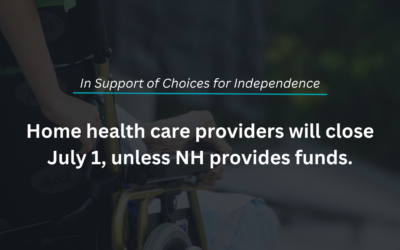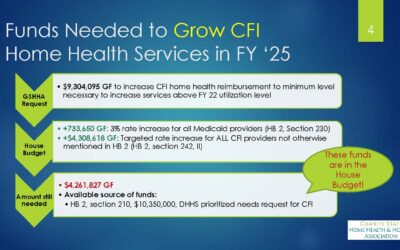Source: Manchester Ink Link
When Carol Chumak thinks of her sons’ graduation, like any proud parent, she remembers what a momentous day it was for both of them.
She had two reasons to celebrate that day. At the Concord High School graduation last spring, both her sons, Nicholas, 20, and Samuel, 22, received their diplomas side by side in the class of 2021.
Like any graduation, the question always comes of what’s next. For Nick, that meant getting his driver’s license and starting a job at Market Basket. For Sam, who has autism, it meant learning to navigate the world of adult programming for those with special needs.
But an unexpected lesson came in the form of what to do in the face of repeated disappointment when staffing shortages at Community Bridge NH – an organization that provides support for individuals with disabilities in the community – meant his services would put be on hold.
Now almost two years out of school, the hopes of getting a job, gaining some independence and learning to navigate adult life with autism are at a standstill for Sam, who has yet to be assigned any form of assistance from the service.
Waiting for support
While many 21st birthdays are celebrated with a night on the town and final passage into adulthood, Sam Chumak’s birthday held a different meaning. When he turned 21 last March he aged out of child support services for people with disabilities.
Aging out meant stacks of paperwork to transition to adult programming, which Carol was ready to tackle. At 21 years old, support would come in the form of Medicaid providing funding for services for her now adult son.
“We had been planning for him to age,” Carol said. “I crossed all my t’s and dotted all my i’s, got everything started, got his Social Security setup, got his Medicaid set up, so that there was nothing lingering when he did.”
Preparing Sam for his adult life also meant connecting with Community Bridges. Before he aged out of programs for younger children, Carol spoke with an intake counselor about potential support services for her son.
As a high-functioning adult with autism, Sam lives at home.
At Concord High, Sam had the chance to talk with friends, teachers and his support aides. Life at home is more isolating.
“He’s just a big, big teddy bear that just wants to be social,” his mom said.
She thought that graduating high school meant Sam could have a job, even if it was part-time. He could fill his days with something to do, that would also give him something to be proud of and help him plan ahead.
But that is yet to happen. Instead, he’s housebound at 22 years old. He likes to play video games, has a blog where he writes about politics and enjoys watching YouTube videos.
He isn’t able to drive and Carol works remotely from their house in Pembroke. If he wants to get out, it up to his mother to help him do so.
“It is very sad,” she said. “It’s not what I had pictured for his after-school life.”
Through Community Bridges, he was promised 20 hours a week of outside community assistance. This means that someone would be able to accompany him to the gym, grocery store or do an activity in the community. He could also receive coaching for job interviews and have someone help him find something part-time.
“Just to do the things that he likes to do and show him that these things are possible to do without your mom holding your hand,” said Carol.
But with severe staffing shortages at Community Bridges, and agencies statewide, Sam’s post-school life feels frozen in time, as he continues to wait for assistance.
“None of those things happened. He’s had no programming,” she said. “I don’t want him to put his life on hold any more than we already have.”
”Where did everyone go?”
Ann Potoczak knows when her phone rings on a Friday afternoon that the other end of the call is probably bad news.
As president and chief executive officer of Community Bridges, she knows how these calls are going to go. Often, it’s a plea to house a patient for the weekend. Or an update that someone needs assistance immediately.
Often these calls lead to a last-minute scramble, and often a staff member working weekends to care for that individual. With each situation, she knows the root cause of the issue – a severe staffing shortage.
Currently, there are 53 open positions out of 160 at Community Bridges – meaning one-third of jobs are vacant, according to Potoczak.
“I jokingly tell people, when I talk about it, it’s like a bus pulled up and everybody got on and we didn’t get the memo,” she said. “We were like, where did they go?”
Potoczak says the pandemic played a large role in the staffing shortage. But she also knows a core group of employees retired. Now the $15 an-hour pay and benefit package Community Bridges offers, is hard to compete with other industries that are trying to attract younger staff.
As one of ten area agencies in the state, Community Bridges is a non-profit based in Concord that contracts with the state Department of Health and Human Services. Although the ten agencies are private, non-profit organizations, they are responsible for providing state-wide care for people with developmental disabilities, with state funding and supervision.
Due to this contract structure, Potoczak said Community Bridges was unable to offer many of the employment incentives other private corporations levied, like bonuses and increased wages, during the pandemic to retain workers.
Hourly pay at Community Bridges is $15 an hour and services are needed 24 hours a day, in some capacity. There are also health and safety requirements, meaning some services, like running their group homes, require multiple staff members per shift.
It makes the need for employees all that more critical, with little room for changes.
“As a business you can close as a restaurant. Not that that’s favorable, but they can shut down a shift for a day or they can close on Mondays,” she said. “We can’t make those adjustments.”
Potoczak knows the pay is low as well. But besides offering flexibility with hours – with the ability to work from home for administrative jobs or take four day work weeks for hands on roles, she’s not sure what else to do.
Earning $15 an hour equates to an annual salary that is below the living wage in Merrimack County. For one adult, a living wage – which the Massachusetts Institute of Technology calculates to be the price point at which an individual can support themselves – is $16.60 in the area.
“We work with human beings on their ability to function and be part of the community as everyone else should be included,” she said. “But we also hire human beings who need to be included and have the ability to live in the community.”
A state-wide problem
When Community Bridges is short-staffed, it means that those with approved funding, like Sam Chumak, are on hold for services.
Sam isn’t alone in this wait. In June 2022, 763 individuals were projected to start services, according to the Department of Health and Human Services. Out of this pool, 33 percent of individuals are without help.
It’s an issue across New Hampshire. The state credits delays to staff and provider recruitment, difficulties in securing a vendor and individual and family requests.
But without a guaranteed living wage and competitive pay scale, increasing employment numbers to fulfill service requests has become a lingering problem with no end in sight.
In the last few years, staffing shortages at the state’s area agencies have only been exacerbated by other service providers closing their doors.
When an individual is deemed eligible for disability services, the first step is assigning them a case worker. The agency then meets with the family to discuss what services are needed and details, such as whether or not the individual would like to live at home or move to a place with continuous care.
If the individual would like to move somewhere, Community Bridges begins to call vendors in the area. One of these vendors used to be The BrockHome in Pittsfield, a community residential home for people with disabilities run by a mother-and-daughter pair.
They too, saw staff drop off one by one until eventually they had to close their doors.
With longtime partners suspending their services, Potoczak has run out options to call to outsource clients.
“Right now, it’s crickets,” she said.
Sitting funds
In her 36 years at Community Bridges, she’s seen budget cuts and other challenges. But she’s never seen a statewide shortage of services like this, she said.
And the shortage means that for people like Sam, eligible Medicaid funding each month is not being spent.
What happens to Sam’s funding is unclear to his mother, Carol.
But Potoczak has a clear answer – it’s unspent.
“Essentially, the funding source just sits until we can provide some attendance to spend the money,” she said.
Sam will turn 23 next month, signaling two years since he first could have received services.
Carol has a friend whose child has Down syndrome. She receives the Medicaid funding directly and is able to organize her child’s services on her own. But for Carol, this solution is also complicated, while working full time and also caring for her other children.
“I need someone to help for him to learn independence, away from mom, so that I can be just Mom. I’m not the taxi, I’m not your job coach,” she said. “I just don’t see Sam thriving and without me opening all the doors and saying, ‘Okay, what do you want to do?’”
In the meantime, there are small things she can do, like take Sam to the grocery story and allow him to shop for himself. It’s no substitute for the two years of unfulfilled services that keep her and her son wondering what comes next.
“I don’t want him to put his life on hold any more than we already have,” she said. “It’s just very disheartening because they promised the world.”


